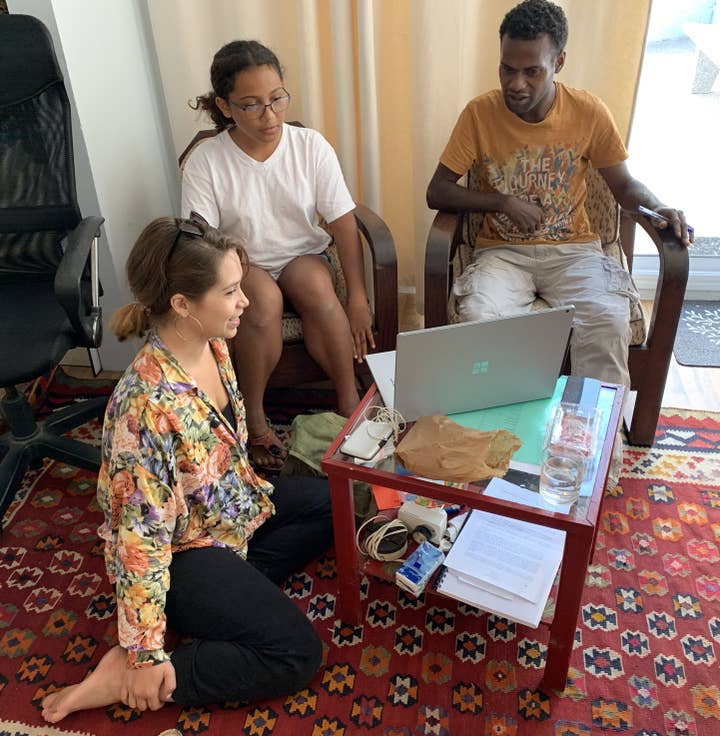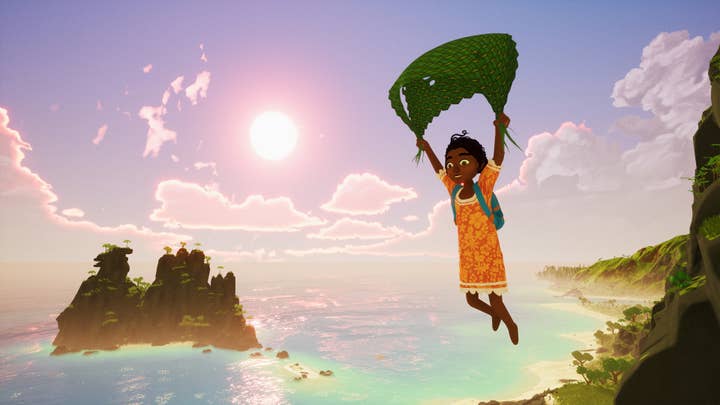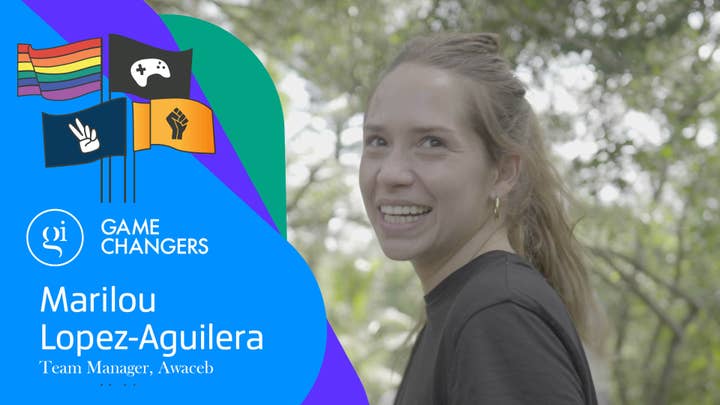Game Changers | Marilou Lopez-Aguilera
Awaceb's team manager discusses the importance of going to the source when making games about different cultures
GamesIndustry.biz Game Changers is a series of profiles on the groups and individuals going the extra mile to make the games industry a better place. These interviews encompass folks from around the world helping to improve conditions and attitudes towards diversity, equity, inclusion, accessibility, mental health and more. You can read more Game Changers interviews here.
New Caledonia is an archipelago in the Southwest Pacific Ocean, a collection of islands that form an overseas territory of France. It is home to the indigenous Kanak people as well as Europeans, various different languages and a unique culture of its own.
It is not the typical setting for a video game, but Montreal-based studio Awaceb is determined to change that with upcoming adventure Tchia – and a large part of its work has been boosted significantly by team manager Marilou Lopez-Aguilera.
Describing herself as "somewhere between HR and a studio manager, and also the happiness manager," she is not only responsible for team welfare and operations but has also been instrumental in the game's production.
Lopez-Aguilera was born in France but raised in New Caledonia. She relocated to Paris at 17 to study art and theatre, in accordance with her art-loving parents' dream of her becoming an actress, but "rebelled" by starting a career in communications and HR. She eventually learned about an opportunity at Awaceb (then based in Bordeaux) – founded by Phil Crifo and Thierry Boura, who are both also from New Caledonia – and applied, landing her first ever role in the games industry.
"When you talk about the culture or the people in this country, it's really important to have those people involved"
Building a video game around New Caledonia in Tchia is a major passion for Crifo and Boura, a passion that Lopez-Aguilera shares.
"The culture of this place is unknown and magical and fantastic and really rich, so it was a good way to talk about it through video games," she says. "And it's important that we have people from New Caledonia in the team to talk about it, because obviously, when you talk about the culture or the people in this country, it's really important to have those people involved. You can spend two weeks in New Caledonia, but you won't know much about New Caledonia and New Caledonian culture."
Being a team of nine, naturally many studio members ventured into different disciplines of development – and even Lopez-Aguilera stepped out of her comfort zone to improve the game's authenticity. Given her parents' hopes for her to take up acting, she spent her childhood attending a theatre in the New Caledonian capital of Nouméa once a week. As such, she brought an extensive knowledge of the local actors and actresses, and took the lead in sourcing the voice cast for Tchia. She even directed the audio recordings.
"It's a small place. So, basically every actress and actor in New Caledonia, I knew them – I knew their names at least. It was easy for me to see, 'Okay, I have the scenario. I see those characters, and this character is this one, and this character is this one.' And I was able to do that.
"Some of the actors that I knew didn't work out. We had to meet the aunt, or the mother, or the cousin of everyone, and go to their place and do a reading of the text, and sometimes it was cool, sometimes it wasn't. Sometimes, we did tests in the studio for vocal things, and we took hours, and at the end, we did everything we can, and it wasn't good enough. It was a journey to make it, but an excellent journey."
She adds that it's important to have an authentic cast for any form of entertainment, citing 2021 film House of Gucci and the Italian accents the cast affected as an example.

"They don't really have Italian accents," she says. "It's super weird. There are Italian actors, there are good ones.
"When you're talking about Kanak people, they have history. So it's really important for us to make voices from the people in New Caledonia who are living this life, through this game, because this game is talking about the culture. We have to make everyone talk about the culture of this country."
Lopez-Aguilera is particularly pleased with the casting of Tchia, the titular character. The young woman who voices her was the same age as the character when they recorded her lines and even looks like her. The actress also had input into the script, helping to tailor the lines to make it authentically sound like the thoughts and reactions of a young girl.
Despite her own origins as a potential actress, Lopez-Aguilera does not voice a role in the game – although she says there is a song that features the entire team.
The team manager even travelled to New Caledonia to handle the casting and audio recording, spending seven weeks away from the Bordeaux studio. But her official role was still a priority when it came to preparing for the trip.
"Before leaving, I was like, 'Are you okay? Are you sure you'll be okay for seven weeks without me?'" she laughs. "And the jet lag is really intense between France and New Caledonia. It's ten hours. So, I was like, 'Are you really sure? I will not be able to talk to you.' But it went well."
Even when back at home, she was in constant contact with the team members that are based in New Caledonia, from the voice actors to the engineers recording authentic sounds, the translator consulting on the script and more.
"Because we have real landscapes in the game, it was phenomenal to have the team see them in real life"
She also decided it was important the two teams meet, and that the studio members get a better feel of the country they were building a game around, so she arranged a two-week excursion for the entire studio to New Caledonia. Lopez-Aguilera describes it as partly a gift to the team, but also another way to ensure authenticity.
"When we hired people, they had one hour of me telling them the history of New Caledonia, talking about things in New Caledonia – but that's not enough," she explains. "And because we have real landscapes in the game that exist in New Caledonia, it was phenomenal to have them see it in real life. For me, it was so important."
The trip also gave Awaceb the chance to gauge thoughts from New Caledonians on how well they were doing with the game. Lopez-Aguilera arranged for a trip to Lifou, where locals could see the game in action, as well as its use of Drehu – one of three indigenous languages spoken in the country, the dominant language of Lifou and the chosen language for the game.
"It was super important for us to present the game to people in Lifou. We used real languages, but obviously we're not Kanak, we don't speak Drehu. But we're from New Caledonia, and wanted to show to people [how we used] the language of the island."
The experience has been a rewarding one for Lopez-Aguilera, and she's keen to stress the importance of studios thoroughly researching the cultures they depict in their games.
"It's something that I think is really obvious," she says. "If you're talking about a culture, you need the people involved in that culture to talk about it. I can't imagine a game about Kanak people in New Caledonia played by people in Los Angeles. We have to work with [local] people because it's important they have their values in it, values that I have in my heart. It counts, it matters."

Lopez-Aguilera is also keen to see more developers explore different cultures in their titles, ones rarely explored in video games.
"I think we put so much pressure on the video games industry, but it's still young and so it's easy to jump to things that people already know," she says. "They are comfortable with shooters, they are comfortable with things [set] in Japan, they are comfortable with things with cars driving fast. And because they are comfortable with it, making it, playing it, the people that give money to video games are comfortable with it because they know everybody is going to buy that kind of thing.
"So many narrative [games are] talking about little cultures and deep [topics], they exist but they don't have money to be shown to the world. We are not the first indie to do this. But talking about cultures… it's the same as movies, it will take time. For the first 50 years of cinema, the movies were the same [themes and settings]. They didn't take the time to move to other countries and make it deeper or talk about things that nobody knew."
"So many narrative [games are] talking about little cultures but they don't have money to be shown to the world"
She adds that this is also a consequence of most games development studios being concentrated in big cities, adding: "Of course, you have things online, but in New Caledonia, if you want to practice and learn how to make video games, basically you can't. Or maybe you are, but you are the only one. So, it's pretty difficult to produce something about the country you are living in. It's easier to make a game when you're living in Paris, and it's easier to talk about the things people know in Paris."
Nonetheless, she urges developers to explore new possibilities when it comes to settings for their games and offers advice on how to make them authentic.
"Working with people that live in the country you are talking about, in the culture you are talking about, within the stuff you are talking about – it's the only thing. For me, it's obvious. It helped us on this project in many ways. We don't speak Drehu, so it was obvious that we had to work with a translator.
"I have a good example. In the text, we have the word 'orphans' in the game, and the translator, he was able to say to us that 'orphan' in Drehu doesn't exist. Because the fact that a child doesn't have any parents doesn't exist, because if the real parents aren't there, if they're dead, if they're living, they do have other parents. Orphan is not a word that exists in Drehu.
"That kind of example – I have a thousand of them – is why it's really important for us to make a game talking about the culture with that kind of thing. Because I was living in this island, but I'm not a Kanak and I don't know everything."

